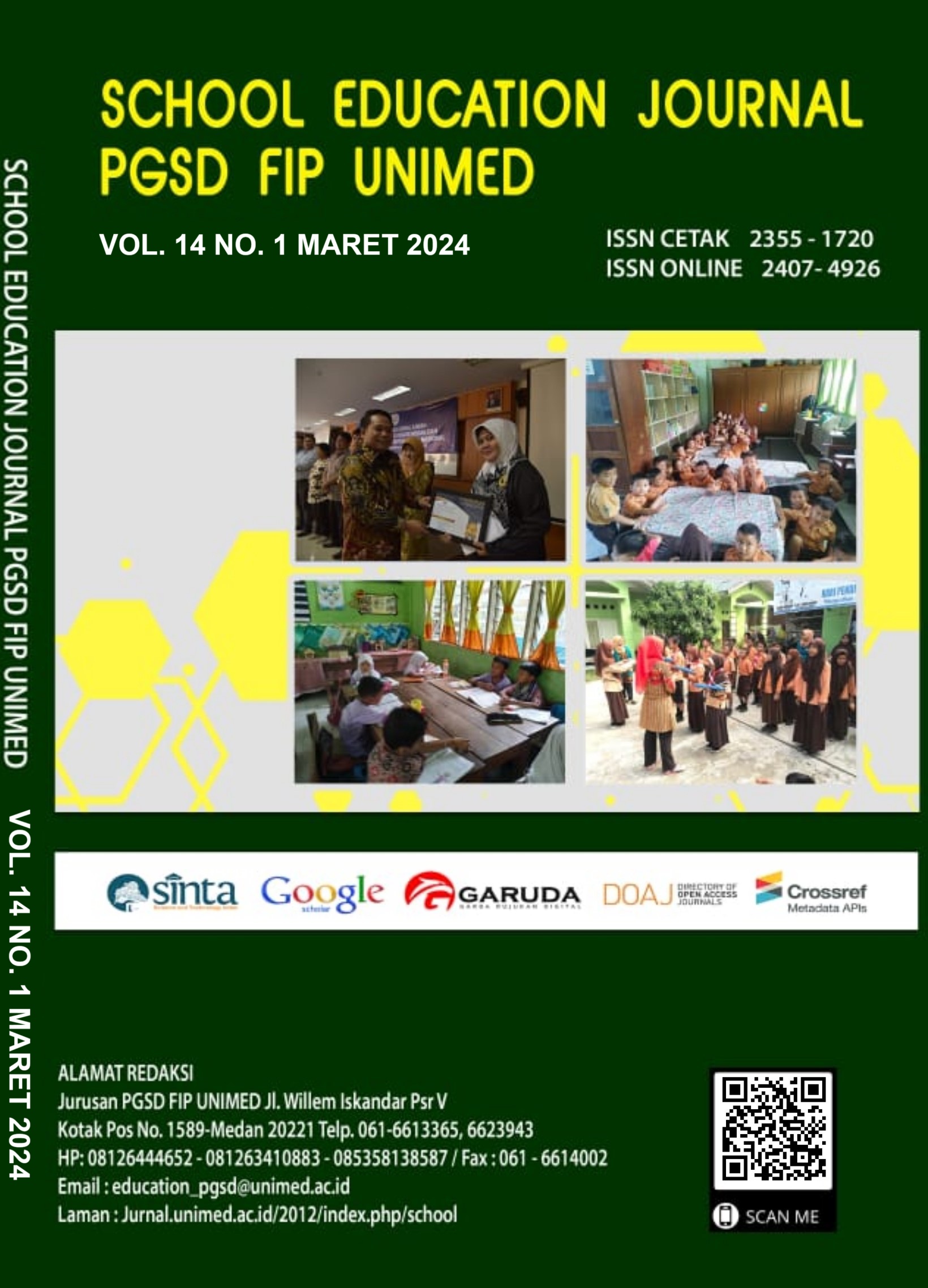EVALUASI IMPLEMENTASI PROGRAM PENDIDIKAN KARAKTER DI SEKOLAH DASAR MENGGUNAKAN CIPP
DOI:
https://doi.org/10.24114/sejpgsd.v14i1.58251Keywords:
CIPP, Character Education Program Implementation, Evaluation.Abstract
The Character Education Programme is a national development priority program to realize the mandate of the 1945 Constitution. According to Stufflebeam, this research is an evaluative research using a descriptive qualitative approach with the CIPP model. The data were obtained through questionnaires, interviews, and document studies with the subjects of students, principals, teachers, and parents of students of SD Kanisius Cungkup Salatiga. This research aims to determine the implementation of the Character Education Programme in SD Kanisius Cungkup Salatiga based on context, input, process, and product. The results showed that the context aspect includes the vision and mission, the 5 fundamentals of Kanisius, and the 5 character values of PPK as the program's foundation. The input aspect provides program planning and supporting resources. The process aspect consists of program implementation, the role of the principal, and teachers. The product aspect consists of goal achievement, results, and program sustainability. It is found that The Character Education Programme at SD Kanisius Cungkup Salatiga can develop students' character. This can be seen from the religious aspect and the nationalist element has developed, the integrity aspect has been cultivated, the independent aspect and the cooperation aspect have developed.References
Adlan Surya Saputra. (2023). Menumbuhkan Disiplin Diri Melalui Disiplin Positif Restitusi. Didaktik : Jurnal Ilmiah PGSD STKIP Subang, 9(2), 5666“5682. https://doi.org/10.36989/didaktik.v9i2.1367
Aji, I. P., & Tamba, K. P. (2020). Penerapan Disiplin Positif Dalam Pembelajaran Ditinjau Melalui Perspektif Kristen [Positive Discipline In Learning Reviewed Through A Christian Perspective]. 3(2), 216“234. https://doi.org/10.19166/johme.v3i2.2101
Al-shanawani, H. M. (2019). Evaluation of Self-Learning Curriculum for Kindergarten Using Stufflebeam™s CIPP Model. https://doi.org/10.1177/2158244018822380
Andrianto, & Suyitno. (2021). Evaluasi Implementasi Program Penguatan Pendidikan Karakter di SD Muhammadiyah Pandes Program Plus Tahun Ajaran 2019/2020. Jurnal Fundadikdas, 4(1), 48“62. https://doi.org/10.12928/fundadikdas.v4i1.3226
Arikunto, S. (2019). Prosedur Penelitian Suatu Pendekatan Praktik. Bandung: Rineka Cipta.
Arikunto, S., & Jabar, S. A. (2018). Evaluasi Program Pendidikan (2nd ed.). Bandung: Bumi Aksara.
Astuti, Y. (2023). Heboh Murid SD di Padang Bentak Hingga Bicara Kasar ke Guru, kini sang Guru Justru yang Meminta Maaf. Tribun Bengkulu. https://bengkulu.tribunnews.com/2023/07/20/heboh-murid-sd-di-padang-bentak-hingga-bicara-kasar-ke-guru-kini-sang-guru-justru-yang-meminta-maaf
Dalmia, & Alam, F. A. (2021). Evaluasi Program Model Context Dan Input Dalam Bimbingan Konseling. Jurnal Bimbingan Konseling Dan Psikologi, 1(Vol 1 No 2 (2021): JUBIKOPS: Jurnal Bimbingan Konseling dan Psikologi), 111“124. https://jurnal.stkipmb.ac.id/index.php/jubikops/article/view/158
Dwikurnaningsih, Y., Waruwu, M., & Wardani, K. W. (2022). A Combination of Context Input Process Product and Kirkpatrick Evaluation Model to Determine the Effectiveness of E-Training for Principals during COVID-19 Pandemic. European Journal of Educational Research, 11(4), 2087“2100. https://doi.org/https://doi.org/10.12973/eu-jer.11.4.2087
Hidayat, N., Danarti, & Dawarti, S. (2016). Disiplin Positif: Membentuk Karakter tanpa Hukuman. The Progressive and Fun Education Seminar The Progressive and Fun Education Seminar, 471“477. https://publikasiilmiah.ums.ac.id/bitstream/handle/11617/7840/57.pdf?sequence=1
Jaelani, A., & Hasanah, A. (2020). Pengembangan Model Evaluasi Pendidikan Karakter Dalam Pembelajaran Di Sekolah. 01(02), 15. http://ejournal.ijshs.org/index.php/incare/article/view/61/49
Maryati, Lian, B., & Sari, A. P. (2020). Evaluasi Implementasi Pendidikan Karakter di SD Negeri 5 Betung Kabupaten Banyuasin. 1(1), 26“35. https://doi.org/https://doi.org/10.52690/jitim.v1i1.27
Permendikbud. (2018). Permendikbud RI No 20 Tahun 2018 tentang Penguatan Pendidikan Karakter pada Satuan Pendidikan Formal. In Menteri Pendidikan Dan Kebudayaan Republik Indonesia. Menteri Pendidikan Dan Kebudayaan Republik Indonesia, https://jdih.kemdikbud.go.id/arsip/Permendikbud_Tahun2018_Nomor20.pdf
Prihatmojo, A., & Badawi, B. (2020). Pendidikan Karakter di Sekolah Dasar Mencegah Degradasi Moral di Era 4.0. Jurnal Riset Pedagogik, 4(1), 142. https://doi.org/10.20961/jdc.v4i1.41129
Ramdan, zaka hadikusuma. (2020). Analisis Implementasi Pendidikan Karakter Di Sekolah Dasar Negeri 155 Pekan Baru Sej (School Education Journal) Vol. 10 No. 1 Juni 2020. School Education Journal, 10(1), 8“16. https://jurnal.unimed.ac.id/2012//index.php/school/issue/view/1893
Rosyad, A. M. (2019). Implementasi Pendidikan Karakter Melalui Managemen Sekolah. Tarbawi: Jurnal Keilmuan Manajemen Pendidikan, 5(02), 173. https://doi.org/10.32678/tarbawi.v5i02.2074
Tim Pusat Penilaian Pendidikan Kemdikbud. (2019). Model Penilaian
Karakter. In Asrijanty & D. Hadiana (Eds.), Pusat Penilaian Pendidikan Jakarta, Desember 2019. Pusat Penilaian Pendidikan. https://puspendik.kemdikbud.go.id/publikasi?download=23
Downloads
Published
Issue
Section
License
Authors whose manuscripts are approved are approved as follows:
The publication rights for all journal manuscript materials published/published on the SEJ (School Education Journal) E-Journal site are held by the editorial board with the author's knowledge (moral rights remain with the manuscript authors).
The formal legal requirements for accessing this electronic digital journal article are subject to the terms of the Creative Commons Attribution-ShareAlike (CC BY) license, which means that E-Journal SEJ (School Education Journal) has the right to store, transfer media/format, manage in the form of a database, maintain, and publish articles without asking permission from the author as long as the author's name remains as the copyright owner.
Manuscripts published/published electronically are open access for educational, research, and library purposes.

